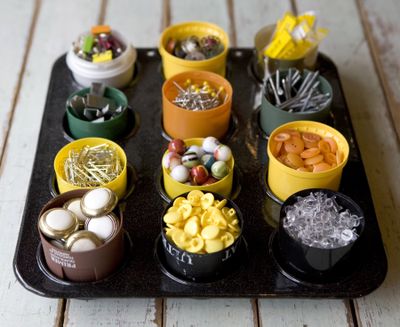How To Give Household Hazards the Boot

You’ve been making changes to give your lifestyle that lovely sheen of green — filling your pantry with organic fare, choosing chemical-free fabrics and scrutinizing labels for scary ingredients before buying. But as you stock your shelves with healthier household products, you inevitably find containers of not-so-green chemicals hiding in the corners. Not wanting to be wasteful, you’ve held onto those half-empty bottles of carpet cleaner, nail polish remover, bug spray and so on. Maybe you figured you might one day use them again. Or maybe, like most of us, you don’t have any idea how to get rid of them safely. It doesn’t seem right to dump them in the garbage or down the drain, where they’ll leach into local waterways. So how can you come clean? Fortunately, there are environmentally responsible ways to give your household hazards the boot.
I’ve come up with a quick-reference list of common disposal dos and don’ts with the help of Earth911 (www.earth911.com). This must-see Web site can fill you in on all you need to know about reducing, reusing and recycling. Their vast database lists over 100,000 recycling locations across the country. If you’re not sure where to find the nearest recycling center or household hazardous waste collection site to dispose of the items below, Earth911 will have the answer.
Household Cleaners
Household cleaners can’t be recycled, and although some sources recommend using them up in order to get rid of them, I disagree. Using them prolongs your exposure to harmful chemicals, and it increases the chances that they’ll find their way down drains and toilets into waterways. Interestingly, drain openers are some of the most toxic of cleaners! Play it safe by depositing your old cleaners at a household hazardous-waste collection site.
Personal Care Products
Hair color, hairspray, nail polish and polish remover may contain petroleum-based solvents or other potentially harmful chemicals that should be disposed of at a household hazardous-waste collection site. Medicines, too, should stay out of the trash. Communities across the country are exploring options for collecting and disposing of unused medications. The Drug Take-Back Network (www.takebacknetwork.com) provides information on pharmaceutical “take-back” programs, more of which are cropping up all the time. You can also call your local pharmacy or search Earth911.
Paint
Because latex paints and stains are not actually deemed hazardous waste, the best way to get rid of them is to use them. (Even spiffing up the doghouse will do!) You can also give perfectly good paint to a neighbor or charity. If you have no use for your old latex paint and stain, use one of the following options to dry it out for safe disposal. (Make sure it’s kept out of the rain and away from children and pets.) With small amounts of leftover latex, remove the lid and let it dry in the can. For larger amounts, mix cat litter, sawdust or sand into the latex and let it dry until it’s a sticky, oatmeal-like consistency. Once dry, discard it in the garbage with the lid off.
Do not try to dry oil-based paint, spray paint or other paint products (like turpentine). Take these items to a household hazardous-waste collection site.
Pesticides
Pesticides like bug sprays, roach traps, mothballs, rat poison and even pet flea collars pose a range of potential health hazards. Those that are particularly dangerous are banned pesticides that may still be lingering in your garage or garden shed. Find a full list of banned or restricted pesticides at www.scorecard.org. The U.S. Fish and Wildlife Service reports that “homeowners use up to 10 times more chemical pesticides per acre on their lawns than farmers use on crops.” Contact your local household hazardous waste collection site for disposal of all home, lawn and garden chemicals.
Motor Oil
According to the U.S. Environmental Protection Agency, over 40 percent of our nation’s oil pollution comes from the improper disposal of used motor oil by do-it-yourself consumers who change their own oil. Earth911 reports that 1 gallon of motor oil can create an oil slick on surface water up to eight acres in size, contaminate 1 million gallons of freshwater and render a 4-acre area of soil unusable for planting for decades! Instead of dumping your used or excess oil, search Earth911’s Web site to find a community oil-recycling location near you.
Other Hidden Hazards
Chemicals and hazardous heavy metals can hide all over the house in smoke detectors, fluorescent light bulbs, batteries and electronic equipment. These items have become part of our everyday lives, but when they break or burn out, it can be tough to decide what to do with them. Again, this is where Earth911 comes in handy. Search their site for recycling or disposal locations near you.